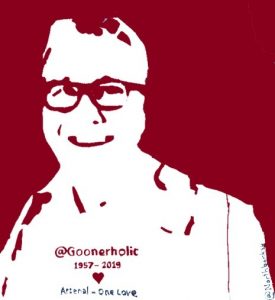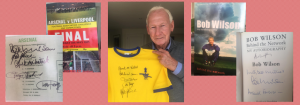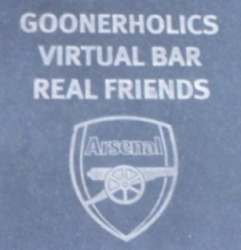
One night last winter, I was helping to transport a very eminent lady from central London deep into rural Kent. We were discussing the state of financial services, the issues of eldercare and the likely outcome of the then forthcoming election. As we drove, she suddenly exclaimed, “I know the other bloke who is as nutty about Arsenal as you are!” and there began my introduction to Dave Seager.
I had read Dave’s book about the great Geordie Armstrong many years ago and knew he was a great friend of our founding father Dave Faber so I determined to get to know him. I’m delighted that, through my friend’s good offices, I have tracked Dave down and am delighted to reveal his latest, very current project and the story, a tragic story in parts, behind one of the leading authors about our special club.
I met up with Dave online this week to find out more about his life and work.
Dave, It is always exciting to talk to major Arsenal authors, especially when they have a new book coming out. We will talk about your new book shortly but for the benefit of our readers can you give us a bit of biographical detail about your Arsenal supporting life.
Major would be generous, but I will take it. I moved from the Midlands to SE London in 1971, aged 5. My first memory of watching football would be 1974, by which time my elder sister’s boyfriend had got me into The Arsenal. He took me to my first match in 1976. It was a bleak period for the team after the break-up of the Double winning team, but three certain young Irishmen were breaking through and exciting times were ahead.
I began travelling up on my own as soon as my parents would allow, and I was old enough to have a part-time job. This was 1981.
Do you have any specific highlights in your Arsenal supporting career? What were the best moments?
My first Wembley final was special in 1987, when we beat Liverpool, thanks to Charlie. I was a very young parent with not much money in the early part of George Graham’s tenure so whilst I was at a few matches in 88/89 I watched Anfield on TV, as most of the nation did. Hard to beat that night!
By the 90s, I was able to attend more as a Registration scheme (Silver) member and by the Wenger era was getting to about half of the matches a season. I had added a second membership by then so I could bring one of my kids or go with a mate.
I am sure the highs and lows after that are similar. The last match versus Everton in 98, the FA Cup Final in 2002, the Invincible campaign etc. The amazing 2 weeks being at the last match at Highbury with my son Liam, and in Paris.
Oddly, given the 9-year trophy drought, I would rank the Hull comeback in 2014 and of course being among the 9000 away fans that Monday night at Old Trafford in 2015. What a night that was!!
I think you were a great friend of the inimitable Dave Faber who started the Goonerholic website. Can you tell us about your relationship with Dave?
Yes, Dave and I became good mates, initially meeting at the Tolly when I first started blogging. We sat a block apart so would either meet for a beer or 2 pre-match or perhaps at half-time. He was waiting for me in the pub, with arms wide open for a hug at my first game back in the February after my son has been killed the previous month. I was with him before his last 2 matches before he became too ill in the autumn of 2020. It was a hammer blow to lose him and the Arsenal blogging and podcasting fraternity, and the wider Arsenal community is the poorer for his loss.
You established the Gunnerstown.com website . Can you tell us a bit about how and why you established it ?
I bought the site, as Welcome the Gunners Town and with my partner, Paul Hepker @invinciblog revamped it to the site it is now. It is quiet now, and the Arsenal blogosphere, as you will know is saturated but in 2014 it was a force.
Essentially, we wanted it to be an uncensored platform, for anyone who wanted to write about our team, but lacked a platform or outlet. In truth, it has been a stepping stone for many who have gone on to journalistic or broadcasting careers, such as Kaya Kaynak at Football London, Matt Cotton at Times Online, Daniel Cowan at BBC South etc. I even persuaded someone called Clive Palmer whose tweets had impressed me to try his hand at writing. God Knows what happened to him!!
Can you tell us why you began writing books about Arsenal ? How did you start the process and what areas have you covered ?
In 2013 on the back of consistent writing for my own site IND2OU, Jill Armstrong approached me to write her father’s story. I thought it was a wind up, but somehow, I got a publisher and made a success of it. Once I had the publisher who has been hugely supportive, as he has of many Arsenal writers (Legends Publishing) I was able to explore a variety of original Arsenal related ideas.
Have you met many major Arsenal figures while researching your books?
Through the Geordie Armstrong book I met a multitude of Arsenal players. Those who played with him and many whom he coached. I have stayed in touch with some and consider a few friends, such as Eddie Kelly and David Hillier. David Dein has also been highly supportive since then.
My second book, Supporting Arsenal is a Funny Old Game, allowed me to meet lots of Comedy Gooners and a few of them are now friends too. I met Matt Lucas, Dara, Romesh, Hugh Dennis, Alan Davies, Milton Jones and many more. Now that was fun!
Your new book is very unusual as far as football books are concerned . Can you tell us a bit about what prompted you to write it and the areas it covers ?
Welcome to the Goonerverse is an anthology of Arsenal inspired poetry. Something it would be fair to say, one might not associate with Football fans. Therefore, it is a gamble, and I truly have no idea how may will buy it, but I am extremely proud of it. I have written many poems myself, but the rich variety comes from over 30 different Gooners contributing.
It was born out of me writing poetry about grief, loss and my relationship with my son Liam, whom we lost in 2019. Some of those were about his football and our mutual love of Arsenal, and 2 of those are in the book. In short, I came to believe that good poetry will only flow if the author is passionate about the subject, and who are more passionate than football fans?
How can we obtain a copy of the book? It sounds fascinating and a number of Holics will be interested in reading it. In fact, we will be giving away a copy to the winner of a competition on the website.
You can preorder now HERE and it will be delivered in early December. £1.50 from each purchase will go to the Arsenal Foundation.
In December, there will be launch events, probably with poetry readings in and around the Arsenal. The club have backed and stocked all my recent books so watch this space and my socials for news.
Dave, have you made plans for your next title? May we wish you very good luck with this publication and all your writing and thank you for sharing the history of your writing career with us.
Honestly, I have no current plans but if this unique concept flies perhaps Goonerverse 2!
Dave, many thanks for your time and good luck with the latest book!
Goonerholics are cultured individuals and a poetry anthology sounds a very fitting part of the literary heritage of our club. I’ve had a sneak preview of the book and I think all Holics will enjoy it and find many special memories stirred by Dave’s words and those of his fellow poets. Please feel free to pre-order and solve that Christmas present dilemma for that hard to please auntie in Devon. Surely all Holics will have plenty of mates who would love a copy?










